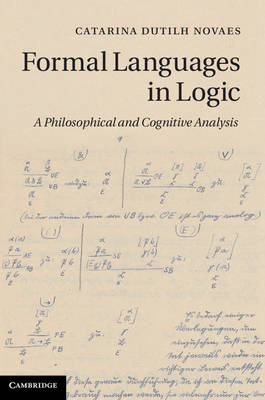
Formal Languages in Logic
A Philosophical and Cognitive Analysis
Seiten
2012
Cambridge University Press (Verlag)
978-1-107-02091-7 (ISBN)
Cambridge University Press (Verlag)
978-1-107-02091-7 (ISBN)
Presents a new approach to formal languages, in particular but not exclusively as used in logic. Focuses on their cognitive impact on human reasoning, drawing on historical developments, psychology, cognitive science and philosophy. For students and researchers in the areas of logic and computer science.
Formal languages are widely regarded as being above all mathematical objects and as producing a greater level of precision and technical complexity in logical investigations because of this. Yet defining formal languages exclusively in this way offers only a partial and limited explanation of the impact which their use (and the uses of formalisms more generally elsewhere) actually has. In this book, Catarina Dutilh Novaes adopts a much wider conception of formal languages so as to investigate more broadly what exactly is going on when theorists put these tools to use. She looks at the history and philosophy of formal languages and focuses on the cognitive impact of formal languages on human reasoning, drawing on their historical development, psychology, cognitive science and philosophy. Her wide-ranging study will be valuable for both students and researchers in philosophy, logic, psychology and cognitive and computer science.
Formal languages are widely regarded as being above all mathematical objects and as producing a greater level of precision and technical complexity in logical investigations because of this. Yet defining formal languages exclusively in this way offers only a partial and limited explanation of the impact which their use (and the uses of formalisms more generally elsewhere) actually has. In this book, Catarina Dutilh Novaes adopts a much wider conception of formal languages so as to investigate more broadly what exactly is going on when theorists put these tools to use. She looks at the history and philosophy of formal languages and focuses on the cognitive impact of formal languages on human reasoning, drawing on their historical development, psychology, cognitive science and philosophy. Her wide-ranging study will be valuable for both students and researchers in philosophy, logic, psychology and cognitive and computer science.
Catarina Dutilh Novaes is Assistant Professor at the Faculty of Philosophy of the University of Groningen, The Netherlands. She is the author of Formalizing Medieval Logical Theories (2007).
Introduction; 1. Two notions of formality; 2. On the very notion of a formal language; 3. The history, purposes and limitations of formal languages; 4. How we do reason, and the need for counterbalance in science; 5. Formal languages and extended cognition; 6. De-semantification; 7. The debiasing effect of formalization; Conclusion.
| Erscheint lt. Verlag | 8.11.2012 |
|---|---|
| Zusatzinfo | 4 Tables, black and white; 1 Halftones, unspecified; 3 Line drawings, unspecified |
| Verlagsort | Cambridge |
| Sprache | englisch |
| Maße | 158 x 236 mm |
| Gewicht | 560 g |
| Themenwelt | Geisteswissenschaften ► Philosophie ► Logik |
| Mathematik / Informatik ► Informatik ► Theorie / Studium | |
| Mathematik / Informatik ► Mathematik ► Logik / Mengenlehre | |
| ISBN-10 | 1-107-02091-3 / 1107020913 |
| ISBN-13 | 978-1-107-02091-7 / 9781107020917 |
| Zustand | Neuware |
| Haben Sie eine Frage zum Produkt? |
Mehr entdecken
aus dem Bereich
aus dem Bereich
ein Gegenentwurf zum kurzfristigen Denken : so werden wir zu den …
Buch | Hardcover (2023)
REDLINE (Verlag)
CHF 27,90
Buch | Softcover (2023)
De Gruyter (Verlag)
CHF 34,90


